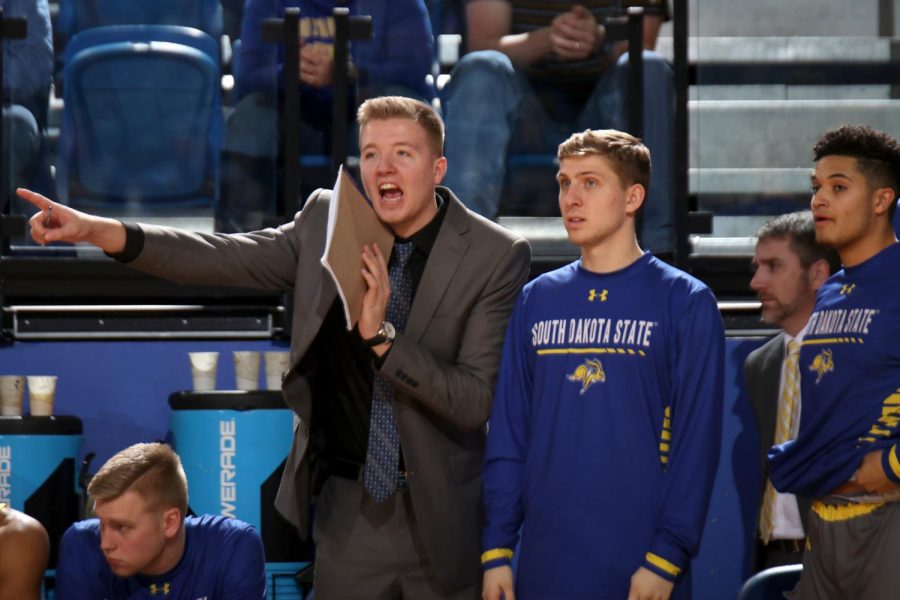Tellinghuisen’s transition from player to coach
Graduate assistant coach Reed Tellinghuisen yells to the players on the court next to Beau Brown during the SDSU vs. Denver men’s basketball game Thursday, Jan. 10 at Frost Arena in Brookings, S.D.
February 27, 2019
At the end of Reed Tellinghuisen’s four years as a South Dakota State men’s basketball player, nobody in the program’s 115-year history started more games than the forward from Sac City, Iowa.
After his eligibility expired, he expressed interest in coaching to head coach T.J. Otzelberger, who agreed to take him on for two more seasons as a graduate assistant coach.
Tellinghuisen started his coaching duties before he graduated in spring 2018. He is in charge of managing film, typing up practice plans, doing workouts, working closely with the playbook and scouting.
Senior forward Skyler Flatten, who played with Tellinghuisen throughout his five previous seasons said he was confident his former teammate would get the job.
“He’s always talked about how he wanted to get into coaching,” Flatten said. “T.J. has always trusted Reed and he knows that Reed takes things seriously, so I had a good feeling that he was going to get the job.”
Assistant coach Rob Klinkefus said Tellinghuisen’s background has prepared him for this role.
“Some guys are wired a certain way and Reed grew up, his dad was a coach for a long time and he’s always been heavily involved in athletics and just has a really good feel on how things are supposed to work,” Klinkefus said. “He’s always certainly a guy you would target as being a coach someday, no question about it.”
When comparing the two roles, Tellinghuisen said coaching uses more of a mental approach to the game, making it a challenge for him as playing comes “a lot easier.”
“There are numerous different game plans and different ways to defend ball screens, and ways to attack defenses that you kind of have to go through just to see what works,” Tellinghuisen said. “We try as a coaching staff to simplify things so our players don’t have to think so much, they can just go out and play.”
The weekly schedule was another thing Tellinghuisen had to get used to in his transition.
“We might have a game on Thursday, but you are already cutting film and trying to scout for Saturday, where as a player, you are more worried about that game Thursday,” Tellinghuisen said.
A typical day for Tellinghuisen has him getting to Frost Arena at 6:30 a.m. for practice. From there, the team transitions into film at 7 a.m. After practice gets done, Tellinghuisen spends time in the office working on film and scouting the next opponent until around 4:30 p.m.
Klinkefus, who has been with Tellinghuisen since he arrived in Brookings his freshman year, said it was natural for Tellinghuisen to end up coaching.
“The one thing Reed would always do is he would do whatever it takes to help the team win a game,” he said. “He made some sacrifices in his career, he was always the toughest guy on the floor, he took the most charges, he was one of our best leaders in the program and he continued to develop.”
There were other options for Tellinghuisen after graduation.
He was contacted by agents overseas about the possibility of him playing professionally. But his trust in Otzelberger, his dedication to the Jackrabbit program, his desire to coach and having to adjust to living abroad persuaded him to stay and take the graduate assistant coaching position.
“I really couldn’t pass it up just because it’s so tough to get a grad assistantship in college basketball coaching, especially for such a great program and a program that has had so much success with a coaching staff like we have here,” Tellinghuisen said. “It was just a great opportunity for me.”
Tellinghuisen moved from the starting lineup, where he played alongside senior forwards Mike Daum and Flatten, senior guard Tevin King and sophomore guard David Jenkins Jr. to offering advice to his former teammates just a season later.
“It’s fun,” Tellinghuisen said. “They had enough respect for me as a player that they listen to me but we like to joke around at times just like we used to.”
Flatten said Tellinghuisen hasn’t changed for the most part in the new role.
“He’s the same old goofy Reed that he’s always been,” he said. “… always cracking jokes at the players. You can kind of see a difference in a more professional look on things that he’s taken on.”
Despite coaching and enjoying it, Tellinghuisen still misses taking the floor in Frost Arena.
“[I] obviously miss it quite a bit and it isn’t easy, but you just have to cherish those moments when you have them because one day, you aren’t going to have them.” Tellinghuisen said.
Despite no longer playing, Tellinghuisen is still attending classes at SDSU, where he is pursuing a sports administration master’s degree.
After graduation, he plans to pursue a career in coaching or another area in athletic administration.
Klinkefus said Tellinghuisen has high admiration from the coaching staff and players.
“When he has something to say, (the coaching staff) listens because two things, one he’s got a really good idea how it works and he knows that it’s probably right,” he said. “He’s earned that respect. He paid his dues in this program, helped this program win a lot of games and he’s putting a stamp on the program in a different way now and it’s good for him.”



















